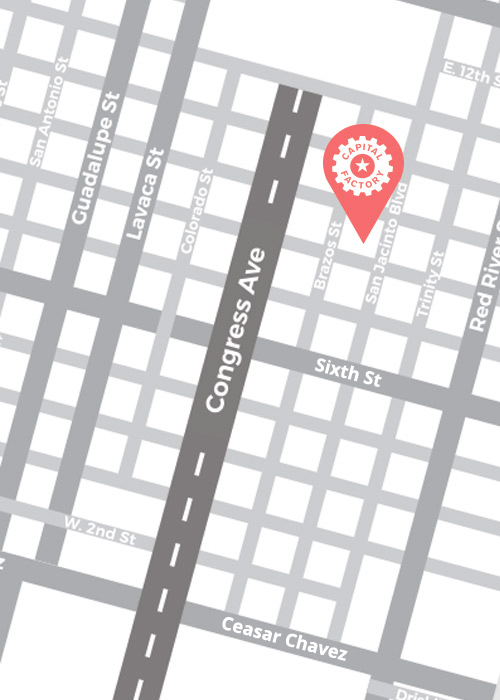THE CENTER OF GRAVITY FOR ENTREPRENEURS IN TEXAS


On October 15, Capital Factory hosted the Latinx in Tech Summit, where over 100 founders, investors, executives, and aspiring entrepreneurs from across the city gathered together for an inspiring and insightful afternoon. Latinx leaders delved into discussions on representation and how to navigate the tech ecosystem, as well as exploring cultural values, perceptions, and resiliency in the Latinx tech community.
For those unfamiliar with the word— Latinx is used as a gender-neutral term to refer to the Latin American community as a whole, and also as an alternative for people who don’t identify with the gendered labels Latino and Latina.
https://twitter.com/MissElisaS/status/1184200976800145408
Cultural Syncism & Intersecting Technology with Humanities
According to Hector Ruiz, Managing Director and Founder at ANSI Capital LLC, there is a lack of “Cultural Syncism” in the world today. He explains that this phenomenon spans from something minor such as people not pronouncing your name correctly, to the way people in the Rio Grande Valley won’t have the same experiences or opportunities as those in Dallas. Cultural Syncism is one of many aspects in society that are affecting minorities and people of color— both of whom are essential in creating valuable technology for our community and beyond.
“Our imagination is bounded by our experience,” Hector shared, and diversity, equity, and inclusion are critical to being able to imagine things properly. Nowadays, only 2% of VC dollars go to companies with female founders, and the percentage is about the same for minorities as a whole. Change can’t happen as quickly as we’d like, but how can we accelerate progress? From a business point of view, Hector offers the solution of making values as important as making money.
The collective “we,” as minorities, need to stimulate progress rather than waiting for VC’s to make that change. He urged guests to take control of the tech ecosystem and keep the momentum going to make a significant impact.
““We have the opportunity to grasp this particular space. We’re gonna do things that aren’t only good for potential business but do great things as humans too.” Hector Ruiz last remarks during his Keynote. #LatinxInTech pic.twitter.com/PpE3JKr9ll
— Capital Factory Diversity ⚙️ (@CFDiversity) October 15, 2019
Localizing to a Latin American Market
Joshua Baer, Founder and CEO of Capital Factory, led a fireside chat with Pamela Esteva Valdés, CEO and Founder of Beek, on her entrepreneurial journey. Despite not having formal coding skills or startup experience, Pamela became a founder by using Facebook as her platform. After spreading the word about her Spanish book review content among friends and existing Facebook groups, she promptly garnered support from 20,000 followers.
What was it about her content that had so many people interested? “People know the Latin American market is huge, but they don’t know that the language is so important,” Pamela noted. For example, content that uses Castilian Spanish (used in Spain) isn’t well-received by Latin American audiences. Which led to Pamela’s point, “Latinos like localized content, it worked with reviews and it should work with audio content as well.”
“ I call Austin my second home because people believe in people. It’s not just about the money you raise but they believe in youas a person.” Pamela Valdez, CEO OF @beek_io talking to @JoshuaBaer during Founders Stories at #LatinxInTech pic.twitter.com/G3XrYu6WHM
— Capital Factory Diversity ⚙️ (@CFDiversity) October 15, 2019
The Cultural Edge of a Latinx Founder
As a Latinx individual, there’s often a sense of needing to “prove yourself.” Manuel Rosso, CEO at Rosso & Flynn Modern Butcher, earned a Master’s degree from the Massachusetts Institute of Technology as a way to establish credibility, but he wishes he had started his entrepreneurial career sooner.
Once he settled into the industry, he noticed a few advantageous Latinx customs— one example is taking care of their extended family. “We have a strong sense of responsibility beyond the person that’s in front of you,” Manuel says, “this is a cultural edge because, as a CEO, you genuinely care for others and their success— you want to help them grow.” Manuel also talked about the Latinx community’s adept ability to communicate emotion and optimism in what they do, which is a key advantage when you’re pitching a startup; among many other networking situations.
Cultural Diversity in the Tech Scene
Three industry professionals discussed their journey in the tech scene, which includes their personal experiences and what they’ve learned along the way. Moderator Josué González, Latin America and Canada Sales Leader of Cloud Sales and Customer Growth at Google Cloud, asked panelists to describe the ways they’ve seen diversity change in the past five years.
Jacob Rosales, Director of Engineering at Vrbo, mentioned how companies are now increasing efforts to diversify their teams. He stated, “You have to bring different perspectives into the products you’re trying to sell.” In order to get your demographics to understand your idea or product, you have to both relate and localize it in the community.
Gretel Perera, Director of PR at Roku and Co-Founder of Latinas in Tech, said there’s been a huge shift in the workplace over the past five years. Latinas in Tech began as an informal networking group, and now it’s grown into a massive organization that tech companies not only embrace but also view as a recruiting opportunity. Gretel attributes the group’s growth to their “unique and authentic passion for helping ourselves.”
Sara Hall, Data Scientist at Valkyrie Intelligence, witnessed her past employers make significant inclusivity changes— such as hiring bilingual staff to expand their reach. A personal challenge for Sara over the years has been her identity, “It’s confusing when you have deep roots in the culture but aren’t born in Latin America.” Re-evaluating your own ideas of identity can be a continuous learning experience.
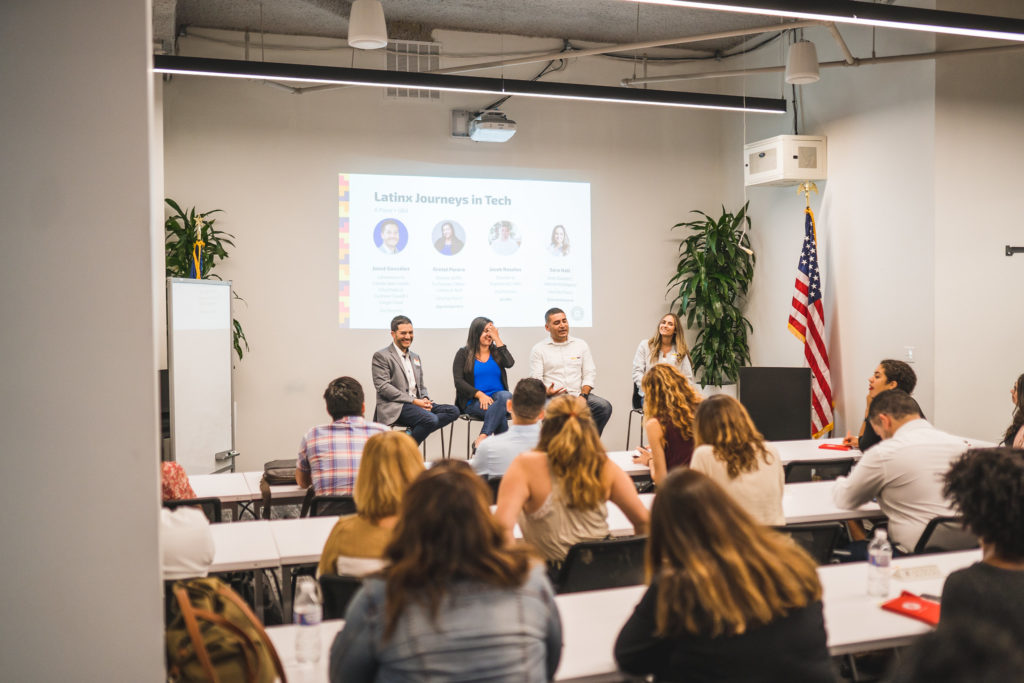
How to Coach & Mentor like a Googler
When 65% of startups fail because of “people problems,” it’s safe to say that connections and human value are important for your team’s success. Camilo Moreno-Salamanca, Team Lead in Emerging Accounts for Spanish Speaking LATAM at Google Cloud, led a workshop about Google’s best practices for coaching and mentorship; with tools and models that you can use to start having more productive conversations.
Among Camilo’s list of traits that make a good manager, one stood out: Inclusive Environment. He explains, “It’s one thing to have a diverse team, it’s another to keep it. The way you keep diverse teams is by making sure people are included at every step of the way, not only when you bring them in.”
Being a good coach to your employees or others in your team requires unlocking their potential and maximizing their performance, helping them to learn rather than teaching them. A helpful tool to check yourself is W.A.I.T., which stands for “Why Am I Talking?” Use this to make sure you’re coaching rather than shifting to problem-solving mode.
Owning Entrepreneurship as a Latina
Monica Peraza O’Quigley, Co-Founder and Co-CEO of The Etho, highlighted the complexities of being a Latina founder and how its affected her, as well as the different cultural mindsets between Anglo American and Hispanic entrepreneurs. Balancing work with four children, not having an established network, and being categorized by her ethnicity in the workplace were some of the challenges she faced as a Latina. Monica said these experiences awakened a desire to empower the community and give back to those that continue to struggle with the uphill battle of entrepreneurship.
Monica believes that when it comes to startup culture, Hispanics tend to play it safe while Anglo Americans take more risks. Since many Hispanics take on the responsibility to take care of their extended family, they approach work with more caution — it’s not just you against the world. Imposter syndrome plays a large role in slowing down progress for entrepreneurial hopefuls as well, but, as she advises, “We have to believe in ourselves and our stories and just show up.”
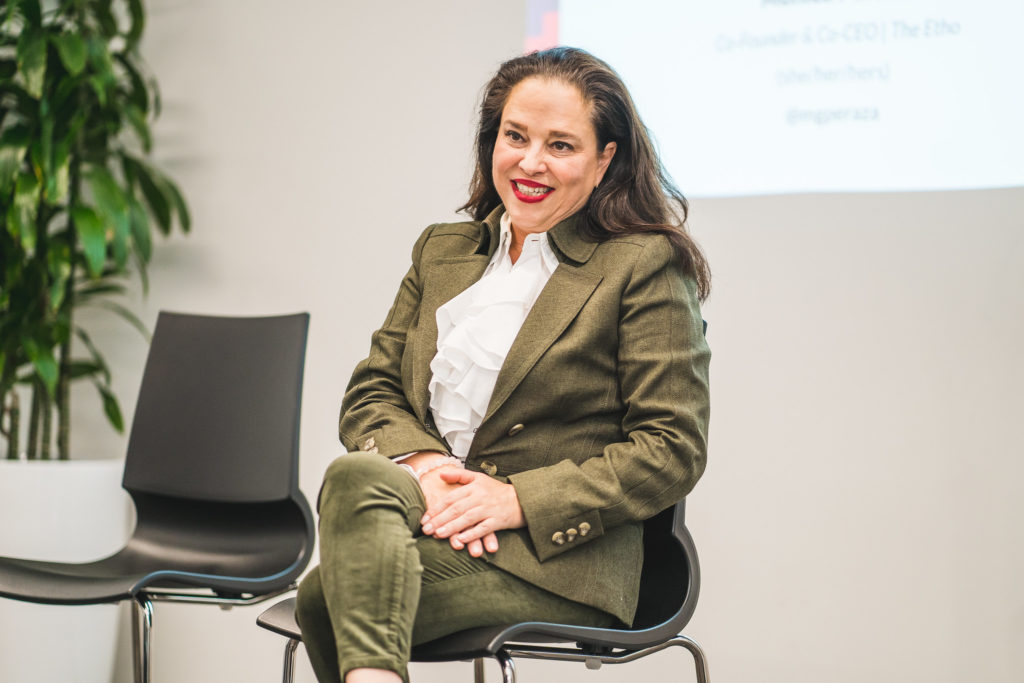
Meet Four Latinx Founders that are Making a Difference
We closed out the day with a showcase featuring four Latinx founders who pitched their startups for a chance to win an in-person meeting with a VC from TXV Partners, a recording session to be featured on Capital Factory’s Austinpreneur podcast, and $5,000 worth of legal services from Vela Wood.
The founders who pitched were:
- Georgina Elizondo Griffin with Blended Sense. Blended Sense matches the right creative teams to the right projects so they can produce and distribute content, like photos and videos, quickly.
- Josh Alballero with IOOGO. They provide a secure, accurate and simple solution to file your taxes in 10 minutes or less.
- Aileen Passariello-McAleer with MamaLingua. Their team helps parents raise bilingual kids by providing the content, tools, and community you need to learn and teach Spanish to your child.
- Gregg Alvarez with Myhouseby. They offer a modern, simpler way to design and bring your dream home to life.
After hearing their compelling pitches, our judges deliberated amongst themselves and decided that the winner was…MamaLingua!
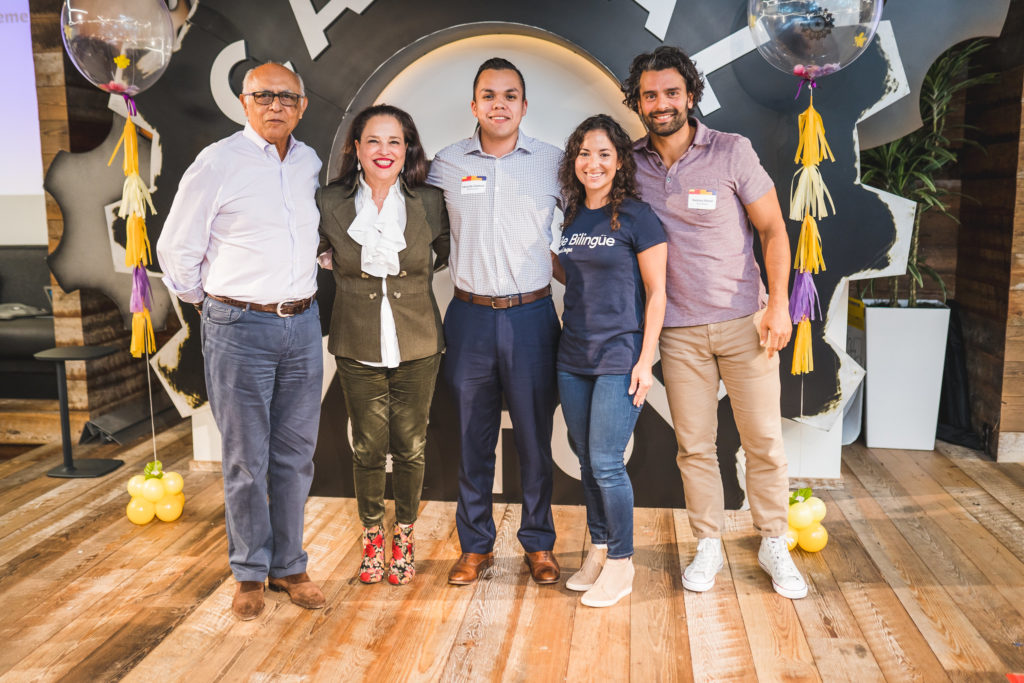
Continue the Conversation with Us
“[The Latinx in Tech Summit] was a wonderful event attended by young, energetic, smart, and intensely dedicated folks who truly want to make a difference through their startup companies!” added our Keynote speaker, Hector Ruiz, Managing Director and Founder at ANSI Capital LLC.
Capital Factory is excited to continue the Diversity, Equity, and Inclusion (DEI) conversation within our community through summits, workshops, and future programming to come in 2020. Stay connected with us through our Austin Tech Live or Dallas Tech Live mailing lists and @CFDiversity for updates.
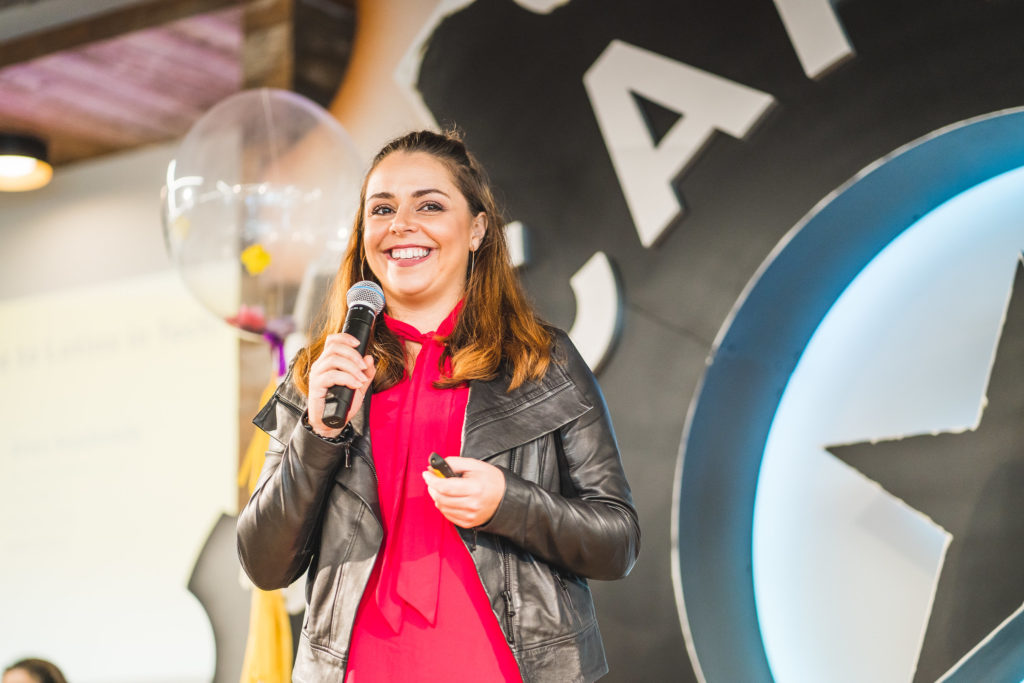
Comments
Categories
Tags
Questions?
By Appointment Only
Our doors are open! Reach out to Members@CapitalFactory.com to book your private, in-person membership tour.
